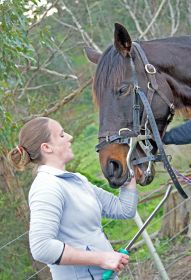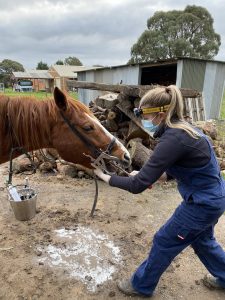Equine Dentistry
Dr Kim Johnson is a member of Equine Dental Vets and our other veterinarians have training in equine dentistry.
Why do horses need dentals?
Horses have 6 upper and 6 lower incisor teeth, then a large gap called a diastema, then a row of cheek teeth on each arcade with a total of 6 teeth in each arcade. Unlike people, dogs and cats, horses teeth are like ‘bricks’ with enamel ridges that form a continuous surface for grinding food. This is needed as they are herbivores and need to break down plant material in order to digest it. When horses cant chew properly they cant break down their food. This may present as –
- Difficult chewing or dropping food (quidding)
- Weight loss
- Poor performance/problems when riding
- Diarrhoea
- Smell and / or discharge from the mouth or nose
- Sinus infections
Horses teeth erupt continuously throughout their life, unlike our teeth. They get ground down by the horses chewing. However due to the fact they dont overlap perfectly, they will form sharp/overgrown enamel points on the outside and front of their upper teeth and inside and back of their lower teeth. This can cause mouth ulcers and pain, plus reduced chewing. This will over time lead to other dental abnormalities and ultimately tooth loss.
 How do we perform equine dentals?
How do we perform equine dentals?
A trained veterinary dentist will perform a full clinical exam to ensure there are no other health problems present, so it is a good time for horses to receive their yearly check up and vaccinations for tetanus and strangles (plus maybe Hendra vaccination). A head exam is performed to check for any sinus infection or abnormal swellings.
The horse may then be sedated with a light tranquilliser.This is to make the procedure safer for the people handling the horse and performing the procedure, as the equipment is heavy, but also means we can perform a more complete oral exam and treatment of all teeth including the back teeth. It also reduces stress for the horse. The incisor teeth are checked and then a ‘gag’ is placed on the horses head. This is a speculum that holds the mouth open and allows the vet to examine in the mouth safely. Once any abnormalities are detected then treatment is undertaken. This mostly just involves ‘rasping’ away sharp enamel points, hooks and ridges that have formed, in order the keep the horse comfortable and allow normal chewing, preventing mouth ulcers and pain.
How often should horses have dentals?
In horses between the age of 5 and 15 we recommend having dental exams and treatment every 12 months, however horses older than 15, younger than 5 and with any dental abnormalities may require dental checks every 6 months. Young horses are prone to very sharp enamel points and also problems with the eruption of their adult teeth.
How often should horses have dentals?
In horses between the age of 5 and 15 we recommend having dental exams and treatment every 12 months, however horses older than 15, younger than 5 and with any dental abnormalities may reuqire dental checks every 6 months. Young horses are prone to very sharp enamel points and also problems with the eruption of their adult teeth.
Are there any risks to my horse?
There are no risks of basic dental examination and treatment, if any further risks are anticipated then the vet will explain these to the client at the time. Sedation is very safe in healthy horses, so reassure clients that the vet will check the horses heart prior to sedating the horse to ensure there is no increased risk.
If you have any questions or would like to book your horse in for a dental exam, please contact us for more information

Get In Touch
Professional Pet Care
Pet owners trust us to look after the needs of their beloved companions. We are specialists committed to delivering the very highest of veterinary care. If your enquiry is urgent please contact us by Telephone during business hours, or for emergencies please visit the Emergency page.
